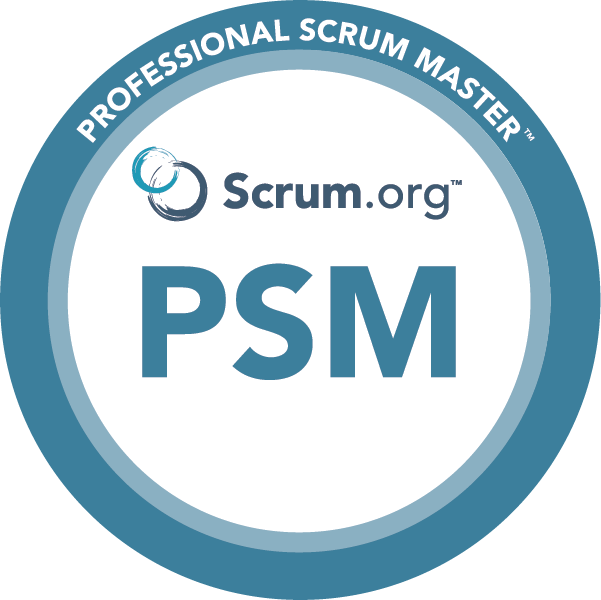In today’s rapidly evolving world of project management, the demand for skilled Scrum Masters is higher than ever. Organizations are increasingly adopting Agile methodologies, and the Professional Scrum Master (PSM Certification) validates an individual’s understanding of Scrum principles and practices. Earning a PSM Certification can significantly boost your career prospects, demonstrating your commitment to Agile values and your ability to effectively lead and facilitate Scrum teams. This article explores the benefits of PSM certification and provides insights into how to achieve this valuable credential.
What is Professional Scrum Master (PSM) Certification?
The Professional Scrum Master (PSM) certification is a globally recognized credential offered by Scrum.org. It validates an individual’s understanding and application of the Scrum framework, as defined in the Scrum Guide. Unlike some other certifications, PSM focuses on practical knowledge and the ability to apply Scrum principles in real-world scenarios. There are multiple levels of PSM, each validating increasing levels of mastery.
Levels of PSM Certification:
- PSM I: Demonstrates a fundamental understanding of the Scrum framework.
- PSM II: Shows a deeper understanding of Scrum principles and their application in complex situations.
- PSM III: Recognizes a mastery of Scrum and the ability to effectively coach and mentor Scrum teams.
Benefits of Obtaining a PSM Certification
Earning a PSM certification offers numerous advantages for both individuals and organizations. For individuals, it provides a competitive edge in the job market, demonstrates commitment to professional development, and enhances earning potential. For organizations, it ensures that Scrum teams are led by qualified individuals who can effectively implement Scrum principles and practices.
- Enhanced Career Prospects: PSM certification is highly valued by employers seeking skilled Scrum Masters.
- Increased Earning Potential: Certified Scrum Masters often command higher salaries than their non-certified counterparts.
- Improved Scrum Team Performance: A PSM certified Scrum Master can effectively guide and facilitate Scrum teams, leading to improved productivity and quality.
- Globally Recognized Credential: PSM certification is recognized and respected worldwide.
Preparing for the PSM Certification Exam
Preparing for the PSM certification exam requires a thorough understanding of the Scrum Guide and practical experience applying Scrum principles. The exam is challenging, but with dedicated preparation, it is achievable. Consider the following tips:
- Study the Scrum Guide: The Scrum Guide is the definitive source of information about Scrum.
- Take Practice Assessments: Scrum.org offers practice assessments that can help you identify areas where you need to improve.
- Attend a Scrum Training Course: A Scrum training course can provide valuable insights and hands-on experience.
- Gain Practical Experience: Apply Scrum principles in real-world projects to solidify your understanding.
PSM I vs. PSM II: A Comparison
| Feature | PSM I | PSM II |
|---|---|---|
| Focus | Fundamental Understanding of Scrum | Deeper Understanding and Application of Scrum |
| Difficulty | Relatively Easier | More Challenging |
| Exam Questions | Multiple Choice, True/False | Multiple Choice, Multiple Answer, Scenario-Based |
| Target Audience | Individuals New to Scrum | Experienced Scrum Practitioners |
Ultimately, obtaining your PSM Certification is a valuable investment in your career and can significantly enhance your ability to lead and facilitate Scrum teams. With diligent study and practical experience, you can achieve this important credential and unlock new opportunities in the Agile world.
But is simply reading the Scrum Guide enough to truly internalize the intricacies of Scrum? Can practice assessments fully replicate the pressure of the actual exam? Should you consider investing in a certified Scrum training course to gain a more comprehensive understanding of the framework? And if you’re already familiar with Agile principles, is the PSM I certification the right starting point, or should you aim higher towards the more advanced PSM II?
Beyond the Certification: What’s Next?
Once you’ve achieved your PSM certification, what steps can you take to further your growth as a Scrum Master? Should you focus on honing your facilitation skills to better guide your team through sprints and daily stand-ups? Or would it be more beneficial to deepen your understanding of Agile scaling frameworks like SAFe or LeSS? Are there opportunities to mentor other aspiring Scrum Masters, sharing your knowledge and experiences to foster a culture of Agile excellence? And how can you leverage your certification to advocate for Agile principles within your organization, promoting a more collaborative and adaptive work environment?
Continuous Improvement: The Agile Way
Isn’t continuous improvement a core tenet of Agile philosophy? Should you be actively seeking feedback from your team members and stakeholders to identify areas where you can improve your performance as a Scrum Master? Are you regularly reflecting on your past sprints to identify lessons learned and implement changes that will enhance future iterations? Shouldn’t you be staying up-to-date with the latest developments in the Agile world, attending conferences, reading industry publications, and engaging with other professionals to expand your knowledge and skills? And considering that technology is constantly evolving, are you exploring new tools and techniques that can help your team work more efficiently and effectively?
The Value of Experience: Is Certification Enough?
While a PSM certification demonstrates a solid understanding of Scrum principles, does it guarantee success as a Scrum Master? Isn’t practical experience just as, if not more, important than theoretical knowledge? Can you truly master the art of servant leadership without spending time working with real teams, navigating complex situations, and overcoming unforeseen challenges? And considering that every organization is unique, shouldn’t you be prepared to adapt your approach to Scrum based on the specific needs and context of your team and stakeholders?
So, armed with your newly acquired PSM certification, are you ready to embrace the ongoing journey of learning, growth, and continuous improvement that defines the spirit of Agile? Is the Scrum Master path one you will continue to follow?

